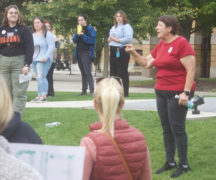Among the nine candidates who went through the gauntlet of cookies and questions at the League of Women Voters Face to Face forum in Bowling Green were those vying for the Ohio House District 75 seat: Republican incumbent Haraz Ghanbari and Democratic challenger Jan Materni.
The race represents a rematch from two years ago. Ghanbari has served in the House since being appointed to fill a vacancy in March 2019.
The meet-the-candidates event is structured so that office seekers move from table to table of voters and answer their questions. BG Independent had three reporters at separate tables. This story is a compilation of what BG Independent reporters Jan McLaughlin, Julie Carle, and David Dupont heard from Materni and Ghanbari.
School funding was a top-of-mind concern for both candidates.
Materni said that the current voucher system needs to end. “I’m totally against it. It’s robbing our public schools of funds.”
The system, which now allows vouchers for religious and private schools to families with as much as $500,000 annual income, is sapping funds from public schools.
This money is going to schools that don’t need to be accredited, don’t have the same testing requirements, and don’t have to enroll students with learning and other disabilities.
In the meantime, Perrysburg, where both Materni and Ghanbari live, struggles to get school levies approved by voters.
Materni has supported income-based vouchers for families who need it to get children out of poorly performing school districts.
Ghanbari said he is a strong supporter of the Cupp-Patterson funding formula, a bipartisan plan approved in 2021.
Ghanbari also questions the voucher system especially how high the income levels are.
Last session, Ghanbari was one of 22 Republican House members who along with the Democratic members supported Republican Jason Stephens for speaker of the house instead of Derek Merrin, who was favored by a majority of Republicans.
Ghanbari said his vote was based on what was best for his constituents not “what was best for Haraz.”
As one of the so-called “Blue-22,” he was challenged by a candidate to his right in the primary. Ghanbari prevailed.
Asked if he will support Stephens again in the next session, Ghanbari said he was concentrating on his current race.
Later when discussing school funding he noted that the race will pit a strong supporter of the current voucher system Matt Huffman, the former Senate President, who is moving to the House because of term limits, against Stephens, whose views are more in line with his.
Ghanbari was asked about the failure of bipartisan legislation to make it through the Ohio House. He responded that his voting record shows his willingness to support bipartisan issues. He pointed to his co-sponsorship with Democrat Elgin Rogers Jr., from Toledo, that would address nursing shortages as another bipartisan effort.
“But I’m only one of 99,” Ghanbari said.
Materni said her service on Perrysburg City Council showed she is able to work across party lines. “We were working for the people of Perrysburg, and what was best for them,” she said, noting that there is no room for “ego” in public service.
Materni referred to herself as fiscally conservative, and talked about the “waste of money” used to repaint the silhouette figures on the Perrysburg water tower. That money could have been put to much better use handling stormwater issues plaguing older parts of the city.
Ghanbari, who serves on the Finance Subcommittee on Public Safety, has put a priority on public safety issues — police, fire, and EMS. Communities that are safe, he said, are more likely to attract development.
He has been able to secure funding for a MARCS (Multi-Agency Radio Communication System) tower for BGSU to eliminate radio dead zones within buildings.
Materni said she would be interested in serving on the Ohio House transportation committee. Materni worked for the Ohio Department of Transportation for 30 years, 20 years on road crews and 10 in management.
Materni also offered her full support for the anti-gerrymandering amendment Issue 1 on the ballot. “Gerrymandering is why people are not held accountable for how they vote. I believe in fair districts.”
A farmer and former township trustee at one of the tables asked for Ghanbari’s thoughts on the mega dairies (Concentrated Animal Feeding Operations) in the region.
“I think there’s certainly some concerns,” Ghanbari said. “But as long as they are operating within the parameters,” they should not be a problem.
The agricultural economy has changed in recent years, with multi-generation farms being sold for development. But people still need products like milk, he said.
“We need to make sure we can sustain communities,” he said.
In his conversations with CAFO operators, Ghanbari said he has heard of complaints lodged against the farms, and then surprise inspections being made by regulators.
Though concerns about spraying too much manure on fields or too close to waterways need to be checked out, Ghanbari said new technology is allowing CAFOs to operate their own wastewater treatment facilities.
“These folks, in my opinion, want to be good neighbors,” he said.
But the farmer and former township trustee who lives close to one mega dairy disagreed. He pointed out the long-term damage to water quality and the destruction of rural roads by CAFO truck traffic.
“Lake Erie’s not going to get better in my lifetime,” said the farmer, whose family has farmed the same land since 1832.
Ghanbari asked the farmer for his thoughts on the state’s H2O water quality program. The farmer responded that it’s a lot of money given out, with no accountability for results.
Early voting is now underway. Election day is Tuesday, Nov. 5, with polls open 6:30 a.m. to 7:30 p.m.




